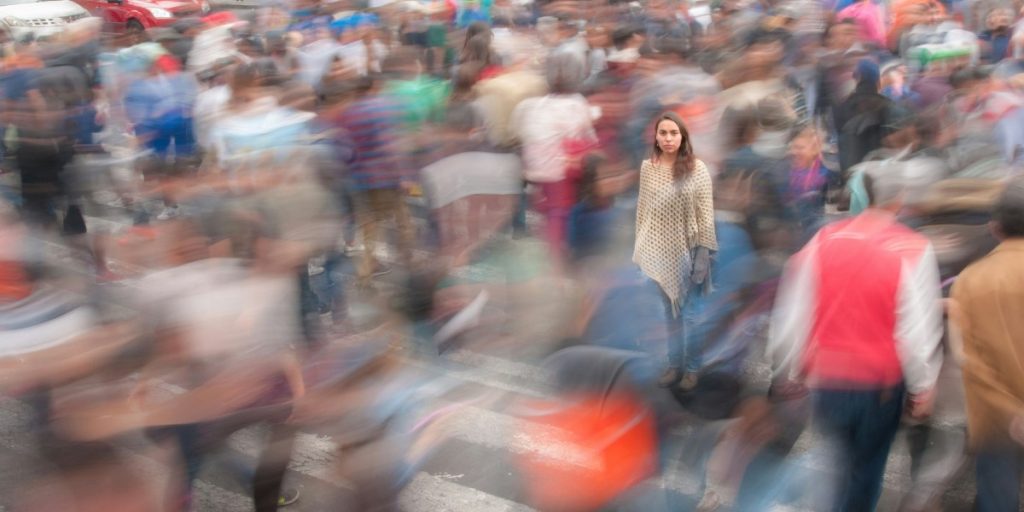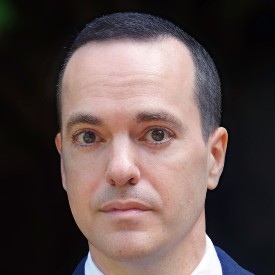Anne Kim is a writer, lawyer, and public policy expert with a long career in Washington, DC-based think tanks working in and around Capitol Hill. She is also a contributing editor at Washington Monthly, where she was a senior writer. Her work has appeared in the Washington Post, Governing, The Atlantic, Wall Street Journal, Democracy, and other publications.
Below, Anne shares five key insights from her new book, Poverty for Profit: How Corporations Get Rich off America’s Poor. Listen to the audio version—read by Anne herself—in the Next Big Idea App.

1. Poverty is big business in America.
You’ve probably driven through low-income neighborhoods in your community and noticed that the businesses in these areas might be very different from what you might find in more upscale neighborhoods. You might see check cashers and pawnshops, maybe a rent-to-own furniture store. But these are only the most obvious examples of industries that rely on poverty as their business model.
The federal government spends about $900 billion a year on programs that directly or disproportionately impact poor Americans. This includes tax credits for the working poor, welfare, Medicaid, food stamps, and housing subsidies—what used to be called “Section 8.” State and local governments spend hundreds of millions more. These dollars represent a massive business opportunity for the companies I call “Poverty Inc.”
Poverty Inc. includes the government contractors that run state Medicaid programs, give job training to welfare recipients, or operate private prisons. It also includes cottage industries that make most of their money from low-income Americans receiving government aid. Some franchised dental practices, for example, cater primarily to patients on Medicaid. Some real estate management companies specialize in renting out Section 8 apartments or building affordable housing with federal tax credits. Even some of America’s largest companies benefit from government spending on poverty. Walmart, for instance, earned 10 percent of its 2021 revenues from food stamps.
The bottom line? The government spends a lot to help low-income Americans, but this money also supports many for-profit companies. This isn’t a good thing for either America’s poor or U.S. taxpayers.
2. Poverty, Inc. hurts the poor.
The poverty industry hurts low-income Americans in multiple ways, but here are two examples. First, some businesses make their money by skimming from the benefits intended for poor Americans. Let’s take, for instance, the tax preparation industry. You probably know H&R Block but might be less familiar with a substratum of companies targeting low-income taxpayers. In particular, they target taxpayers who qualify for the federal Earned Income Tax Credit, also known as the EITC.
The EITC sent $61 billion in refunds to low-income working taxpayers in 2021, making it one of the federal government’s largest anti-poverty programs and a tempting target for tax-time entrepreneurs. Firms charge hundreds of dollars to file returns. They also charge hundreds more for predatory “fast cash” instant refunds, which are basically like payday loans. Some companies work with used car dealers, check cashers, and other businesses, which are also angling for a cut of people’s refunds. For instance, when I called the Car Mart dealership in Rogers, Arkansas, they offered to do my taxes for $318, or about 15 percent of the average refund taxpayers got that year. They also offered to let me use the rest of my refund on a down payment for a used car, which I could buy that very same day.
“Medicaid dentists, for instance, have faced government prosecution for putting fillings into baby teeth and performing root canals on toddlers.”
A second way that Poverty Inc. hurts the poor is through bad service. A lot of the money the government spends on job training, for example, goes to ineffective for-profit contractors who don’t train people very well or help people find jobs. Government funds might keep these contractors working but not the clients they’re supposed to help. There has been company after company that has been investigated, indicted, fined, or audited for poor performance, if not outright fraud. Medicaid dentists, for instance, have faced government prosecution for putting fillings into baby teeth and performing root canals on toddlers. In one such case, a North Carolina dentist was accused of performing 17 root canals on a three-year-old. Why did he do this? Because Medicaid pays for every procedure performed. The more procedures you do, the more money you can make.
Practices like these result in tragedy for poor Americans—and they’re a travesty for U.S. taxpayers.
3. We need to dump the idea that the free market can solve complex social problems.
In 1981, President Ronald Reagan famously proclaimed that government isn’t the solution but the problem. In the 1990s, President Bill Clinton likewise declared that the “era of big government is over.” Politicians love to denigrate “big government,” and over the last forty years, these anti-government sentiments have led to successive waves of “privatization”—or contracting out government services to private actors, including for-profit corporations.
It’s one thing to let private companies collect the garbage. It’s another to ask them to solve the problem of poverty—because the simple truth is that they can’t. For one thing, the poverty industry benefits from persistent poverty because they otherwise wouldn’t have a business. Industries that depend on poor people as their customer base or on a public program that serves the poor need poverty to persist if they want their businesses to survive. Some industries have even turned to lobbying lawmakers to preserve their markets.
The tax prep industry, for instance, has spent millions fighting Congressional efforts to simplify the tax code or to allow low-income Americans to e-file with the IRS for free. Private prison companies have lobbied for harsh sentencing laws to get more “customers” within their walls. Companies also sue each other when they lose lucrative government contracts. This happened in California, for example, when the state revamped its Medicaid program, called Medi-Cal. When Blue Shield of California was shut out of new Medicaid contracts in 2022, its CEO posted a public letter blasting the company’s competitors as “for-profit health plans with poor track records in improving access to quality care.” These competitor companies he criticized are, of course, the ones now running Medi-Cal.
Another reason companies can’t effectively solve big societal problems like poverty is because they have a legal duty to serve their shareholders. Their first priority—as it should be—is making money. It’s not their mission to think about the impacts of social policy on poor Americans or the return on investment to U.S. taxpayers. That’s the job of Congress and state legislatures. But over the years, we’ve increasingly abdicated that responsibility to industries. Maybe we shouldn’t be surprised by the results.
4. We need to stop blaming the poor for poverty.
One of the most enduring debates about poverty’s causes is the role of “personal responsibility.” Americans believe in the idea of “rags to riches”—that anyone who works hard enough can “pull themselves up by their bootstraps” to achieve the “American Dream.” This notion of “personal responsibility” has a long history in American social policy. It’s why current federal law puts a five-year time limit on welfare benefits and requires recipients to work. When Congress passed welfare reform in 1996, the legislation was, in fact, titled the “Personal Responsibility and Work Opportunity Reconciliation Act.”
Of course, personal choices matter. But what also matters is the choices available to you, and that depends on your zip code, race and other factors outside your control. For many low-income Americans, these “choices” are limited or non-existent, dictated by the industries that colonize low-income communities. “Personal responsibility” is a myth when the poverty industry controls the choices you have.
“But what also matters is the choices available to you, and that depends on your zip code, race and other factors outside your control.”
For instance, many people don’t have access to affordable healthy food because dollar stores and bodegas control the food choices in low-income neighborhoods. “Willpower” can’t overcome a diet where the only available options are ultra-processed foods high in fat and sodium—like much of what’s served in school lunches to poorer children. Pizza Hut, for example, offers what it calls its “A+ Pizza Program” for school cafeterias. The company says its pizza crusts are made with “51 percent white whole wheat flour” to comply with federal nutrition standards for the National School Lunch Program. Other companies make their money processing surplus meat and dairy products that the USDA supplies to public schools for free. In one instance noted by the writer Lucy Komisar, the Michigan Department of Education sent contractors free USDA chicken worth $11.40 a case—and paid these same contractors $33.45 a case to get them back as chicken nuggets.
Poverty and its consequences exist, in part, because of the infrastructure of choices available to people. That infrastructure is too often shaped by the motives of companies that exploit the poor or the programs intended to serve them.
5. We need to stop bashing the government and instead work to fix it.
Politicians love using the government as a punching bag to further their ambitions. But this rhetoric has real consequences, including the gradual hollowing of governmental infrastructure over the last several decades and the diminution of public accountability.
Thanks to privatization, the “shadow government” of federal contractors is many multiples larger than the actual federal workforce. According to New York University professor Paul Light, contractors for the U.S. Department of Health and Human Services outnumber federal workers by a ratio of more than 35 to one! While this department employed about 15,500 workers in 2017, it also supported more than 556,000 contractors. One result has been the growth of gigantic public companies like Maximus, Inc., which reported $4.9 billion in 2023 revenues. The company earns almost all of its money from federal and state contracts, but as a public company, it’s ultimately answerable to its shareholders, not U.S. taxpayers.
Taxpayers should demand more information and accountability about where their dollars are going and how effectively they’re being spent. Citizens should demand that the government reclaim its authority over the provision of public services, especially social services for the poor. As it is, the government isn’t delivering most human services programs—contractors are. We don’t fully grasp the impacts of that, for good or for ill. Better information, management, and accountability can only mean better use of taxpayer money, better programs that more effectively benefit low-income Americans, and an end to the abuse and exploitation of the poor.
In 1964, President Lyndon Johnson ambitiously declared war on poverty. Hundreds of billions of dollars later, this war might seem to have failed. In 2022, the national poverty rate was 11.5 percent—about what it was in 1977. But it’s still important to remember that government programs do, in fact, lift millions of Americans out of economic misery. In 1959, before Medicaid, Social Security, and other safety net programs, more than one in five Americans lived in poverty, including 35 percent of seniors and 27 percent of kids. We’ve made tremendous progress.
But we need to do more. Poverty Inc. has been a significant drag on the effectiveness of federal anti-poverty programs and may even contribute to poverty’s persistence. Uncovering and dismantling the business of poverty could go a long way toward moving us forward.
To listen to the audio version read by author Anne Kim, download the Next Big Idea App today:
































